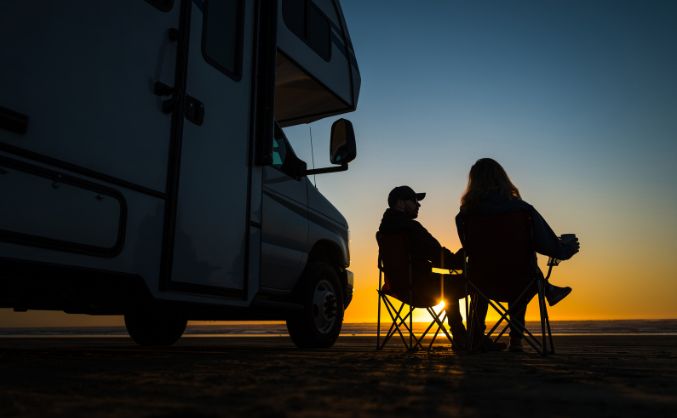
Imagine cruising down the highway, windows down, soundtrack pumping, with the open road stretching before you. It’s the dream of many — exploring new places from the comfort of your own RV. But before you hit the gas, there’s one detail to consider: What does RV insurance cover?
RV insurance offers a blend of home and auto insurance coverage, designed specifically for recreational vehicles. RV insurance typically includes liability coverage, comprehensive and collision coverage, protection against uninsured/underinsured motorists, personal property protection, and emergency expenses. You can also add additional options like roadside assistance and full replacement cost coverage to your policy. In this article we’ll review the different types of RV coverage available and how they can benefit you.
Understanding the Key Types of RV Insurance Coverage
RV insurance shares some similarities with car insurance, but it also offers additional protections specifically tailored to RVs. Here’s a breakdown of the essential coverages:
Liability Coverage:
Liability insurance is the foundation of your RV policy. Coverage pays for the bodily injury and property damage you cause to others in an accident involving your RV. Similar to car insurance, liability coverage comes in two parts:
Bodily Injury Liability:
Covers medical expenses for people injured in an accident you cause, up to your policy limits
Property Damage:
Pays for damage you cause to someone else’s property, such as their vehicle, home, or other structures
Collision Coverage:
Coverage kicks in if your RV is damaged in a collision with another vehicle or object. Collision insurance can help pay for repairs or, in extreme cases, the total replacement of your RV.
Comprehensive Coverage:
This option is often referred to as “other than collision” coverage. It helps protect your RV from non-collision-related incidents, such as fire, theft, or storm damage. Think of it as a safety net that catches you when unexpected events threaten your mobile home.
Uninsured/Underinsured Motorist Protection:
Despite laws requiring insurance, some drivers on the road may not have sufficient coverage. This coverage protects you if you’re in an accident caused by a driver who has no insurance or inadequate coverage.
Additional Coverage Options to Consider
The coverages mentioned above form the core of RV insurance. However, there are additional options you might want to consider for a more comprehensive safety net:
Medical Payments Coverage:
This option helps pay for medical expenses for you and your passengers in case of an accident. Coverage is available regardless of who’s at fault.
Roadside Assistance:
RVs face mechanical issues, too, and they can benefit from roadside assistance coverage. Coverage typically includes towing, jump starts, flat tire changes, and even locksmith services.
Personal Property Protection:
This coverage insures belongings inside your RV. You can insure things like electronics, clothing, or other personal items.
Total Loss Replacement:
This coverage ensures that if your RV suffers a total loss in an accident or theft, you will get a new, comparable RV. The coverage actively protects your investment, offering you a brand-new start after an unexpected loss.
Vacation Liability Coverage:
This option covers your liability for accidents that happen while you’re using your RV for recreational purposes. For instance, if someone is injured while visiting your RV, this coverage can help.
Get a Tailored RV Insurance Quote from Terra & Hit the Road with Confidence

Now that you have a better understanding of what RV insurance covers, it’s time to explore your options and get a quote. If you’re seeking personalized insurance solutions that cater to your adventurous spirit, Terra Insurance is here to help. Our experts are committed to finding the right coverage for your RV, ensuring that your travels are safe and secure. Visit our website to explore our services and discover how we can protect your mobile lifestyle.
Contact Terra Insurance today for a free RV insurance quote. We’re here to ensure that your journey is smooth sailing, from the first mile to the last.
Frequently Asked Questions (FAQs)
Is RV insurance required?
Most states require a basic level of RV insurance by law, especially if you own a motorhome. The required coverage usually includes liability insurance. For towable RVs, such as trailers and fifth wheels, your auto insurance may provide some coverage. However, it’s often not enough to fully protect your RV.
Does my car insurance cover my RV?
Most times, no. Standard car insurance policies typically exclude RVs. You’ll need a specific RV insurance policy for proper coverage.
How much does RV insurance cost?
The cost of RV insurance varies depending on several factors. Costs will vary based on the type of RV you own, your driving history, your location, and the amount of coverage you choose.
Can I get temporary RV insurance for a short trip?
Yes. Many insurers offer short-term RV insurance policies for people who need coverage for a few days or weeks. Temporary coverage can be an ideal option if you’re renting an RV or taking a short vacation.
How can I reduce my RV insurance premiums?
You can reduce your RV insurance premiums by maintaining a good driving record and installing safety features. Also, look at higher deductible plans or bundling your RV insurance with other policies (like auto or homeowners insurance). Always check with your insurance provider for any discounts you may be eligible for.
